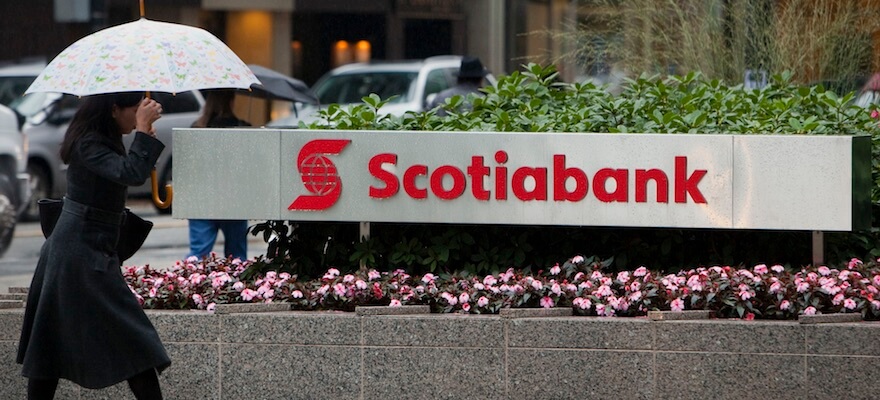Scotiabank, the third largest bank in Canada by deposits and market capitalization, has joined hands with Latin American fintech Accelerator NXTP Labs in order to test different approaches to assimilating external innovation into the bank’s customer offerings. Register now to the London Summit 2017, Europe’s largest gathering of top-tier retail brokers and institutional FX investors The partnership aims to Leverage innovations of NXTP’s start-ups to help drive the bank’s global digital banking transformation and move toward implementing a world class internet banking capability. In addition to getting involved with the startup innovation ecosystem, the fintech firms will get access to co-working spaces that the bank is associated with, which spans over multiple geographies and strategic alliances with leading fintech and VC firms. Scotiabank is undertaking a broad digital transformation strategy and hopes that this partnership with fintech firms will help identify service gaps they can fill with offerings developed at a low cost. It also builds a co-platform for young entrepreneurs to share their ideas and technology solutions. NXTP Labs is a Latin American early stage fund which recently launched its first fintech accelerator program, with 35 startups selected from Argentina, Chile, Ecuador and Uruguay. The firm’s accelerator offers significant institutional support and deep regional networks, particularly with limited startup resources and funding options in the region represent a main challenge for fintech entrepreneurs. Nacho Deschamps, Head of International Banking and Digital Transformation at Scotiabank, commented: "We are thrilled to partner with Latin America's premier start-ups accelerator to further advance our global digital banking strategy. This partnership will allow us to gain competitive advantage, accelerate innovation, and form Fintech partnerships to offer innovative solutions to our 24 million customers."
Scotiabank, the third largest bank in Canada by deposits and market capitalization, has joined hands with Latin American fintech Accelerator Accelerator An accelerator or startup accelerator is defined as fixed-term programs that look to foster investment, connections, sales, and education to kindle growth in a project.Most commonly this effort constitutes a public pitch event, demos, and other forms of marketing. Startup accelerators are most commonly associated with Silicon Valley, a global hub for investing and fintech.Startup accelerators however are a global phenomenon that privately funded as an investment fund. This nature of investing he An accelerator or startup accelerator is defined as fixed-term programs that look to foster investment, connections, sales, and education to kindle growth in a project.Most commonly this effort constitutes a public pitch event, demos, and other forms of marketing. Startup accelerators are most commonly associated with Silicon Valley, a global hub for investing and fintech.Startup accelerators however are a global phenomenon that privately funded as an investment fund. This nature of investing he Read this Term NXTP Labs in order to test different approaches to assimilating external innovation into the bank’s customer offerings. Register now to the London Summit 2017, Europe’s largest gathering of top-tier retail brokers and institutional FX investors The partnership aims to Leverage Leverage In financial trading, leverage is a loan supplied by a broker, which facilitates a trader in being able to control a relatively large amount of money with a significantly lesser initial investment. Leverage therefore allows traders to make a much greater return on investment compared to trading without any leverage. Traders seek to make a profit from movements in financial markets, such as stocks and currencies.Trading without any leverage would greatly diminish the potential rewards, so traders In financial trading, leverage is a loan supplied by a broker, which facilitates a trader in being able to control a relatively large amount of money with a significantly lesser initial investment. Leverage therefore allows traders to make a much greater return on investment compared to trading without any leverage. Traders seek to make a profit from movements in financial markets, such as stocks and currencies.Trading without any leverage would greatly diminish the potential rewards, so traders Read this Term innovations of NXTP’s start-ups to help drive the bank’s global digital banking transformation and move toward implementing a world class internet banking capability. In addition to getting involved with the startup innovation ecosystem, the fintech firms will get access to co-working spaces that the bank is associated with, which spans over multiple geographies and strategic alliances with leading fintech and VC firms. Scotiabank is undertaking a broad digital transformation strategy and hopes that this partnership with fintech firms will help identify service gaps they can fill with offerings developed at a low cost. It also builds a co-platform for young entrepreneurs to share their ideas and technology solutions. NXTP Labs is a Latin American early stage fund which recently launched its first fintech accelerator program, with 35 startups selected from Argentina, Chile, Ecuador and Uruguay. The firm’s accelerator offers significant institutional support and deep regional networks, particularly with limited startup resources and funding options in the region represent a main challenge for fintech entrepreneurs. Nacho Deschamps, Head of International Banking and Digital Transformation at Scotiabank, commented: "We are thrilled to partner with Latin America's premier start-ups accelerator to further advance our global digital banking strategy. This partnership will allow us to gain competitive advantage, accelerate innovation, and form Fintech partnerships to offer innovative solutions to our 24 million customers."





















